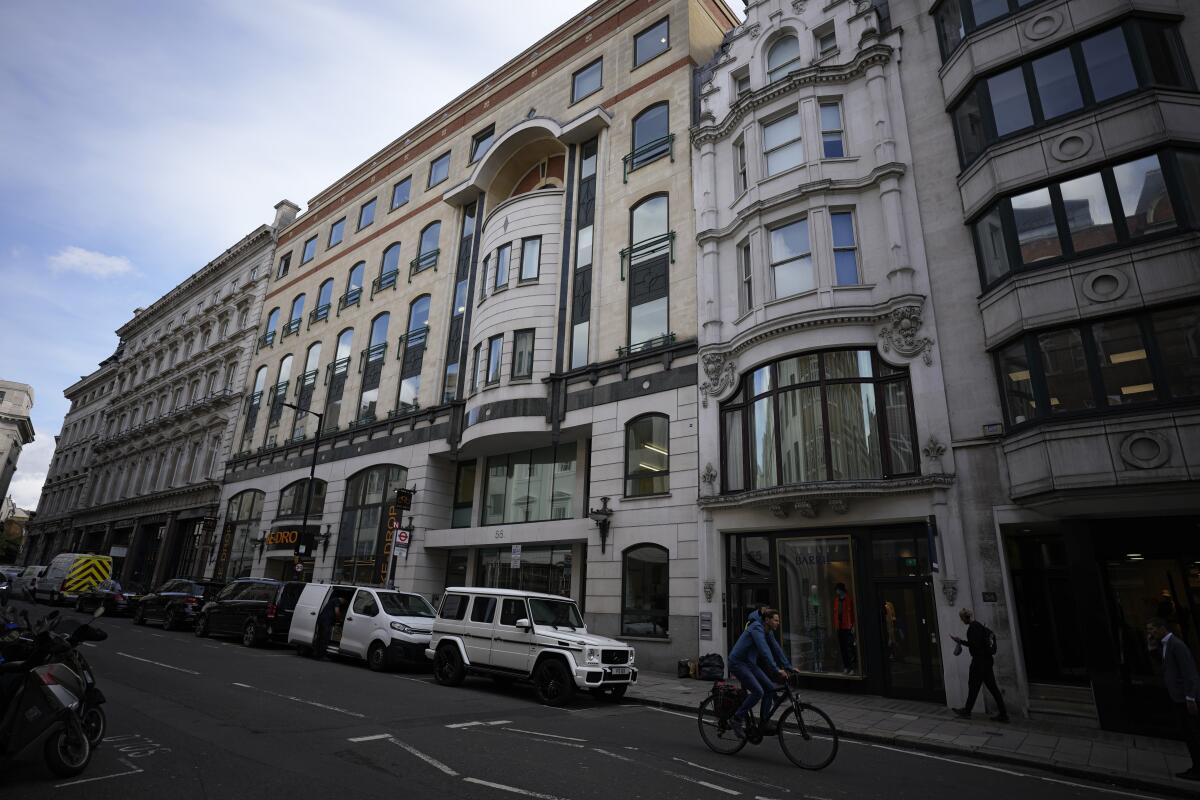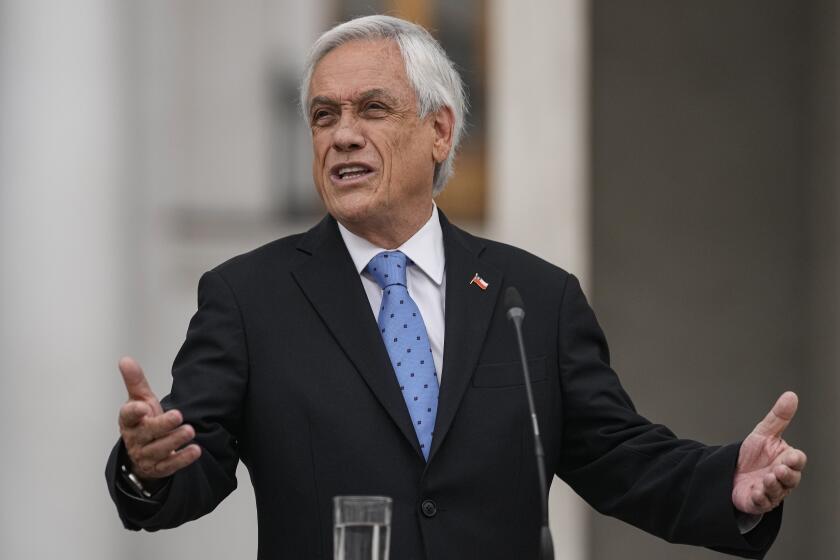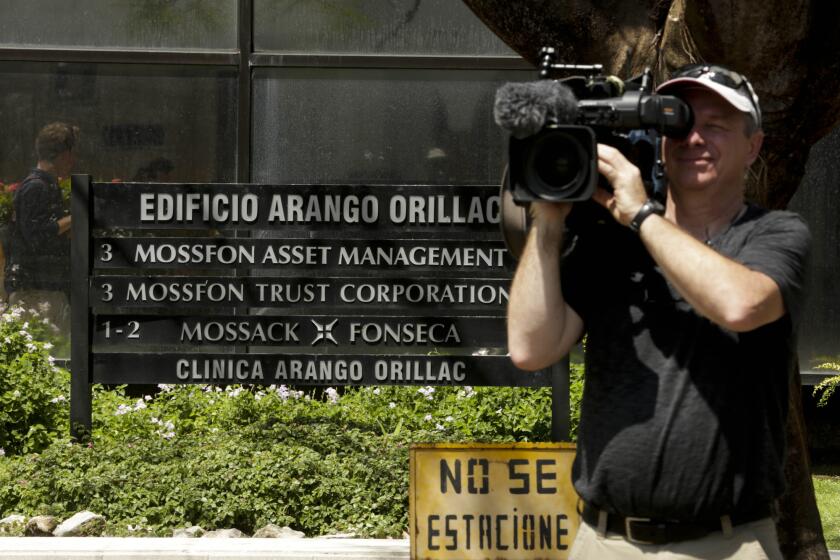‘Pandora Papers’ show London to be a key hub for concealing cash and avoiding tax

- Share via
LONDON — Transparency advocates are calling on Britain to tighten the country’s defenses against money-laundering and tax avoidance after a massive leak of financial data showed how London is a key destination for some of the world’s richest and most powerful people to conceal their cash.
The trove of almost 12 million leaked files shows how wealthy people around the world reportedly set up offshore companies to buy property and avoid taxes.
Foreign individuals identified as beneficiaries of these types of offshore accounts in London include Jordan’s King Abdullah II, Azerbaijani President Ilham Aliyev and associates of Pakistani Prime Minister Imran Khan. Abdullah has denied any impropriety, and Khan tweeted that his government would investigate anyone mentioned and take appropriate action if wrongdoing is found. Aliyev hasn’t commented.
The leaked financial data, dubbed the Pandora Papers, were published starting Sunday by the International Consortium of Investigative Journalists and its media partners, including the Washington Post and the BBC.
Though the property purchases are legal under British law, they highlight the complicated — and often anonymous — financial practices that wealthy individuals employ to avoid tax, far removed from the everyday experience of most of the British population.
London is a hub of choice for the rich and powerful because it’s home to a sophisticated ecosystem of businesses that can help in the process, including creative wealth management firms, high-end lawyers and long-established accounting firms.
A global investigation has revealed how the rich and powerful have being hiding their investments in mansions, exclusive beachfront property, yachts and other assets for the past quarter-century.
A 2019 analysis by transparency group Global Witness indicated that about 87,000 properties in England and Wales were owned by anonymous companies registered in tax havens.
It said that 40% of the anonymously owned properties identified were in London and that the total value of the properties was likely to be more than $135 billion. Popular areas were said to include the three boroughs of Camden, Kensington and Chelsea, and Westminster, where the British Parliament is.
The London property market has for years struggled to shake off a reputation for playing a central role in how rich people around the world seek both to hide and accentuate their wealth, with many prime properties in the heart of the city owned by non-nationals. Russian oligarchs have been high-profile purchasers of London properties in recent years, for example.
For decades, authorities in the U.K. have pushed a light-touch approach to regulation in order to attract foreign capital and talent. Critics say that has been a magnet for tax avoidance, which can be legal, as well as more criminal activities, including money-laundering.
The headlines about the “Panama Papers,” the gigantic trove of offshore records that surfaced this week, were all about the famous names connected to secret financial accounts: Russia’s Vladimir Putin, Ukraine’s Petro Poroshenko, China’s Xi Jinping, Syria’s Bashar Assad, Saudi Arabia’s King Salman and more.
Duncan Hames, policy director for the campaign group Transparency International U.K., said the disclosures should act as a “wake-up call” for the British government to deliver on long-overdue measures to strengthen the country’s defenses against “dirty money.”
“These leaks show that there is one system for corrupt elites who can buy access to prime property and enjoy luxury lifestyles and another for honest hard-working people,” he said. “Once again Britain’s role as an enabler of global corruption and money-laundering have been exposed with the same loopholes exploited to funnel suspect wealth into the country.”
Transparency International U.K. is urging the government to close a loophole that allows companies in the U.K.’s offshore financial centers, such as the British Virgin Islands and the Cayman Islands, to hold property in the country without requiring these companies to reveal the names of their true owners.
It also wants the government to crack down on professionals who help those with illicit wealth move and hide their cash in Britain and to properly equip the National Crime Agency to go after those suspected of having made their money through crime and corruption.
Chancellor of the Exchequer Rishi Sunak said Britain’s tax authorities would inspect the Pandora Papers. He defended the country’s record on tackling tax avoidance.
“I don’t think it is a source of shame because actually our track record on this issue is very strong,” Sunak told BBC radio.
He pointed to measures taken over the past decade by the government to improve transparency in terms of who owns what and to exchange data between tax authorities.
“As you’ve seen from the papers, it is a global problem, there’s a global dimension to it and we need other countries to cooperate with us to tackle this, but we are determined to do that,” Sunak said.
News Alerts
Get breaking news, investigations, analysis and more signature journalism from the Los Angeles Times in your inbox.
You may occasionally receive promotional content from the Los Angeles Times.
Sunak added that there is “always more we can do” when he was asked about reports that half of all Russian money-laundering is estimated to occur in Britain.
Opposition parties said the revelations, which also raised questions over donations to the ruling Conservative Party, needed to be acted on urgently by the government.
“The tentacles of dark money exposed by the #PandoraPapers reach into the heart of U.K. democracy,” Labor Party foreign affairs spokeswoman Lisa Nandy said in a tweet.
More to Read
Sign up for Essential California
The most important California stories and recommendations in your inbox every morning.
You may occasionally receive promotional content from the Los Angeles Times.












